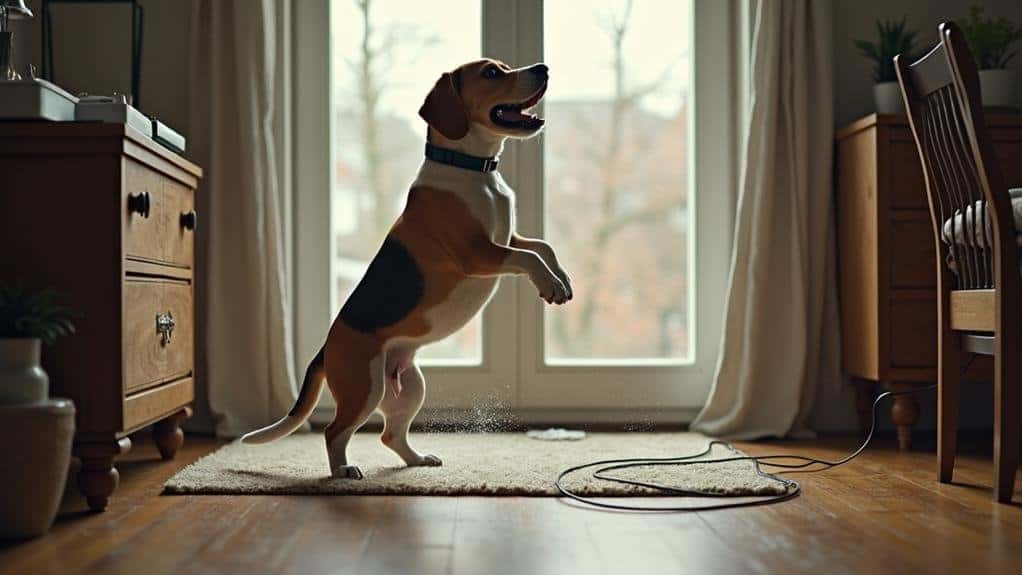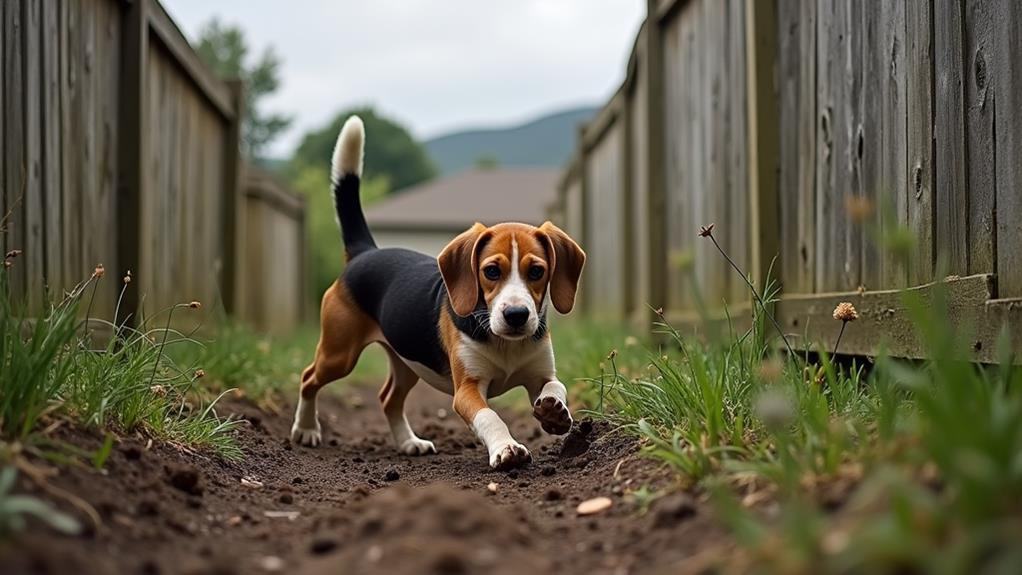Beagles can be challenging pets due to their stubborn nature and independent streak.
You’ll find they’re prone to excessive barking and howling, which can drive you (and your neighbors) crazy.
Their high energy levels demand plenty of exercise, and their strong prey drive makes walks an adventure. Beagles are notorious escape artists and have a knack for food theft, so you’ll need to be vigilant.
Training can be frustrating due to their selective hearing and easily distracted noses.
Add in their messy habits and potential for separation anxiety, and you’ve got a handful. But don’t worry, there’s more to these lovable troublemakers than meets the eye.
Stubborn and Independent Nature

From within the world of dog breeds, Beagles stand out for their stubborn and independent nature.
You’ll quickly discover that these adorable hounds have minds of their own, often choosing to ignore your commands in favor of following their noses.
This independent streak can make training a real challenge, so brace yourself for some frustrating moments!
When it comes to obedience, Beagles aren’t exactly star pupils. Their stubbornness means you’ll need to:
- Be patient and consistent
- Use creative training techniques
- Provide plenty of motivation
Don’t be surprised if your Beagle suddenly decides that chasing a scent is more important than listening to you.
Their powerful noses can lead them astray, making recall a particularly tricky skill to master.
You might find yourself waving treats and calling their name while they’re off on their own adventure!
For first-time dog owners, this combination of independence and stubbornness can be overwhelming.
You’ll need to channel your inner zen master to stay calm when your Beagle decides to do their own thing.
Excessive Barking and Howling

Neighbors mightn’t appreciate your Beagle’s vocal talents as much as you do. These pups are known for their excessive barking and howling, which can quickly become a nuisance in apartment living or noise-sensitive areas.
Your Beagle’s vocal nature is deeply ingrained, especially if they come from fieldline breeding, where barking is more prevalent.
To keep the peace with your neighbors and your sanity intact, consider these tips:
- Start early training: Nip those noisy habits in the bud before they become ingrained.
- Provide mental stimulation: A bored Beagle is a noisy Beagle, so keep their minds engaged.
- Exercise regularly: Tire them out to reduce vocalizations caused by pent-up energy.
Escape Artists and Wanderers

If you’ve ever owned a Beagle, you’re likely familiar with their reputation as escape artists and wanderers.
These clever canines have a knack for finding their way out of seemingly secure areas, leaving their owners scratching their heads in disbelief.
Why are Beagles such notorious escape artists?
- Strong prey drive: Your Beagle’s powerful nose and instinct to follow scents can lead them to wander off during walks or outdoor playtime. They’re easily distracted by enticing smells, making it challenging to keep them focused on you.
- Independent nature: Beagles have a stubborn streak that can make them determined to explore on their own terms. This independence often results in them searching for ways to escape from your yard or home.
- Clever problem-solvers: These pups are surprisingly adept at finding weak spots in fences or small openings they can squeeze through. They might even dig under barriers to satisfy their curiosity about what’s on the other side.
To keep your Beagle safe and prevent unwanted adventures, you’ll need to be vigilant. Implement beagle-proofing measures in your yard, use a secure leash during walks, and provide plenty of mental stimulation to curb their wanderlust.
Challenging to Train

Training a Beagle can be a true test of patience and perseverance. You’ll quickly discover that these adorable hounds are notorious for being challenging to train, thanks to their stubborn nature and strong scent drive.
When you’re trying to teach your Beagle basic commands, don’t be surprised if they seem to have selective hearing!
Here’s why Beagles can be such tricky students:
- Stubbornness: Your Beagle’s independent streak means they might ignore your commands, even if they understand them perfectly well.
- Scent distractions: That powerful nose of theirs can lead them astray during training sessions, making it hard to keep their attention.
- Slow progress: You’ll need to be prepared for extensive groundwork and repetition to achieve reliable responses.
To overcome these hurdles, you’ll need to employ consistent training techniques and have an abundance of patience.
Early socialization is essential, but even then, many Beagle owners report ongoing difficulties.
Don’t forget to keep a watchful eye on your furry friend around food, as they’re prone to snatching and stealing.
With time and dedication, you can make progress, but be prepared for a challenging journey!
High Energy Requirements

While training a Beagle can test your patience, keeping up with their energy levels might just exhaust you. These pint-sized pooches pack a powerful punch when it comes to their high energy drive. You’ll need to set aside at least an hour each day for exercise, or you might find yourself dealing with a four-legged tornado in your living room.
Here’s what you’re in for with a Beagle’s energy requirements:
- Daily workouts: Plan for 50-60 minutes of active playtime, walks, or runs.
- Outdoor adventures: Their hunting instincts mean they crave outdoor exploration.
- Mental stimulation: Puzzle toys and scent games are a must to keep their minds busy.
If you can’t meet these needs, you’re in for a world of trouble. Bored Beagles often turn to destructive behavior, transforming your favorite shoes into chew toys.
And don’t even think about leaving them alone for too long – separation anxiety can kick in, leading to howling sessions that’ll have your neighbors on speed dial.
Destructive Behavior When Bored

Three telltale signs of a bored Beagle can wreak havoc on your home. First, you’ll notice chewed-up furniture and scratched floors, as your furry friend seeks an outlet for their pent-up energy.
Second, your belongings might mysteriously disappear, only to be found in shreds later.
Finally, you may come home to find your garden has been transformed into a maze of holes.
Destructive behavior in Beagles often stems from their high energy level and need for constant stimulation. When left alone for extended periods, these clever canines can develop separation anxiety, leading to attention-seeking behaviors that might cost you a fortune in repairs.
Boredom is another culprit, causing your Beagle to engage in activities like digging or stealing food to keep themselves entertained.
To prevent these destructive tendencies, you’ll need to:
- Provide ample exercise (50-60 minutes daily)
- Offer mental stimulation through games and puzzles
- Use positive reinforcement training to curb their stubborn streak
Strong Prey Drive

A Beagle’s strong prey drive is both a blessing and a curse for owners. While it’s fascinating to watch your furry friend’s keen nose in action, this instinct can lead to some challenging situations.
You’ll quickly learn that walks aren’t just leisurely strolls but rather adventures in scent-tracking!
Your Beagle’s high energy levels, combined with their strong prey drive, mean they require a lot of supervision and exercise. Here’s what you might experience:
- Constant distractions: Your pup will be drawn to every interesting smell, making walks an exercise in patience.
- Off-leash risks: Letting your Beagle roam freely can be dangerous, as they’re likely to ignore your calls in favor of an enticing scent.
- Rolling in the wrong stuff: Be prepared for your dog to find the smelliest things to roll in, much to your dismay.
Training a Beagle can be difficult due to their independent nature and focus on scents.
You’ll need to be creative and persistent in your training methods, using positive reinforcement and engaging activities to keep their attention.
Scavenging and Food Theft

Nearly every Beagle owner has a tale of their furry friend’s food-stealing antics.
These clever canines have a knack for scavenging that’s hard to beat, thanks to their strong prey drive and food-driven nature. You might find yourself constantly on guard, as your Beagle’s nose leads them to raid countertops and tables when you’re not looking.
Training your Beagle to resist the temptation of food theft can be an uphill battle.
While some improvement is possible, don’t expect miracles. Their stubborn streak and independent nature often trump your best efforts. To make matters worse, many Beagles display “fake guilt” after snatching a snack, appearing proud or indifferent instead of remorseful.
To protect your pantry and sanity, you’ll need to:
- Secure all food and valuables
- Never leave food unattended
- Be consistent with training
- Provide plenty of mental stimulation
Messy Habits and Hygiene Issues

Cleanliness isn’t a Beagle’s strong suit. These adorable pups come with a host of messy habits and hygiene issues that can turn your home into a disaster zone.
Let’s explore the not-so-pleasant aspects of Beagle ownership:
1. Coprophagia and Yard Clean-up
You’ll need to be vigilant about cleaning up after your Beagle, as they’ve a tendency to eat feces. Daily yard clean-ups are essential to prevent this gross behavior and maintain a hygienic environment.
2. Rolling in Smelly Substances
Beagles love to roll in strong odors, including animal remains and feces. This means your pup might come home from a walk smelling like a dumpster, requiring frequent baths.
3. Shedding Galore
As heavy shedders, Beagles will leave a trail of fur wherever they go. You’ll find yourself constantly vacuuming and lint-rolling to keep your home fur-free.
4. Destructive Tendencies
When left alone, Beagles can become destructive, leading to torn-up furniture and scattered belongings. This behavior not only creates mess but can also be costly to repair.
Separation Anxiety Tendencies

While Beagles can turn your home into a mess, their emotional needs pose an equally significant challenge.
You’ll quickly discover that these adorable hounds are prone to separation anxiety, which can lead to a host of problems when you’re not around.
Beagles thrive on companionship, and leaving them alone for extended periods can result in emotional distress.
Here’s what you might experience:
- Destructive behaviors: Your furniture and belongings may become chew toys as your Beagle attempts to cope with anxiety.
- Excessive barking or howling: Your neighbors won’t be thrilled with the constant noise.
- Scratching and digging: Doors, floors, and walls might bear the brunt of your pup’s distress.
If you’ve rescued a Beagle, you’re in for an even bigger challenge.
These dogs often have stronger separation anxiety due to past experiences.
To keep your Beagle happy and well-adjusted, you’ll need to provide:
- Regular companionship
- Consistent mental stimulation
- Early crate training
Frequently Asked Questions
Why Do Beagles Have a Bad Reputation?
You’ll find beagles have a bad reputation due to their strong prey drive, vocal nature, stubbornness, and destructive behaviors. They’re prone to ignore commands, bark excessively, and cause property damage when left alone, frustrating unprepared owners.
What Are the Bad Things About Beagles?
You’ll find that beagles can be challenging pets. They’re stubborn, hard to train, and easily distracted. You’ll deal with constant shedding, loud barking, and potential separation anxiety. They may also cause issues with allergies and noise complaints.
Why Are Beagles Difficult Dogs?
You’ll find beagles difficult due to their stubborn nature and strong prey drive. They’re high-energy dogs needing lots of exercise, and they’re prone to excessive barking. Their separation anxiety can lead to destructive behaviors when left alone.
Why Is My Beagle so Annoying?
Your beagle’s annoying behavior stems from their vocal nature, stubbornness, and high energy. They’re likely barking excessively, ignoring commands, or engaging in destructive activities. Their strong prey drive and messy habits can also contribute to frustrating experiences.
Conclusion
You’ve seen that beagles can be a handful, but don’t let that discourage you if you’re set on this breed. Remember, every dog is unique, and with patience, proper training, and the right environment, you can overcome many of these challenges. If you’re up for the adventure and can provide the attention and exercise a beagle needs, you might find that their lovable personalities make it all worthwhile. Just be prepared for a vocal, energetic, and sometimes mischievous companion!

